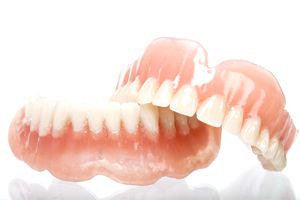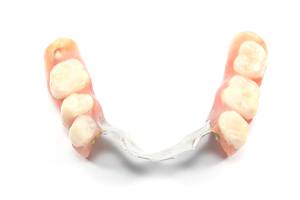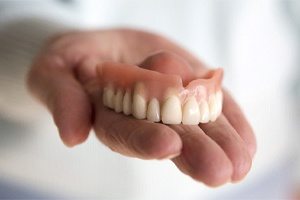Full and Partial Dentures – Northampton, MA
A Full Set of Teeth for Eating and Speaking
When you lose an entire arch of teeth – whether it’s the upper row or the lower one – getting dentures is vital for maintaining good quality of life. You’ll be able to eat a wide variety of foods, talk clearly, and smile with confidence again. EMA Dental can give you full or partial dentures in Northampton to completely restore your grin. If you’re facing life with extensive tooth loss, schedule a consultation with us today!
Types of Dentures

Dentures all fall into one of two categories: full dentures and partial dentures. Both are removable appliances that are used when there’s been a lot of tooth loss.
- Full Dentures: This is most likely what you picture in your mind when you hear the word “denture.” They’re usually made of acrylic and are composed of a gum-colored base supporting an entire arch of false teeth. They rely on natural suction or adhesive to stay in place while eating or speaking. If there are a few teeth remaining, they’ll be extracted before the denture is placed.
- Partial Dentures: Sometimes there’s still a healthy number of teeth left in the mouth but there are a few gaps here and there. Partials can replace multiple teeth at once in different areas. Unlike full dentures, they can use a metal clasp to stay in place.
What are the Benefits of Dentures?

Without a full set of teeth, you won’t be able to effectively chew as many foods, which can result in poor nutrition. Dentures will let you enjoy a varied diet that’ll keep you healthy – not to mention you’ll be a lot happier when you can eat more of your favorite meals!
For patients who are worried about appearances, modern dentures are made with materials that resemble the natural teeth or gums. This means that you can laugh, talk and smile with confidence.
Of course, you may need to get your dentures replaced or adjusted from time to time, but if you treat your false teeth well, they can last for about 10 years.
Denture Maintenance

You’ll need to take your dentures out from time to time to clean them; just because they’re not real teeth doesn’t mean that you can ignore the bacteria that accumulates on them! When removing dentures, always do so over a towel or a filled sink in case you drop them by accident. Then you can rinse them with warm water and brush them gently. Do not use normal toothpaste or soap that could damage the appliance; only use a cleanser designed to be used on false teeth.
Don’t neglect your gums. Even with your teeth gone, they’re still vulnerable to infection. You can brush the gums and other soft tissues in your mouth (such as your tongue) with your toothbrush; antibiotic mouthwash can also be useful for killing bacteria.
Implant-Retained Dentures

One downside of traditional dentures is that they won’t prevent the loss of bone in the jaw brought about by missing teeth. As a result, your facial structure will collapse, and you’ll look older. The shape of your mouth changes as well, affecting the fit of your dentures.
Dental implants – metal posts used to support false teeth – can be inserted into the jawbone so that it gets the stimulation from chewing and biting that it needs to stay healthy and strong. Dentures that have been secured by implants have better chewing power and won’t slip.
